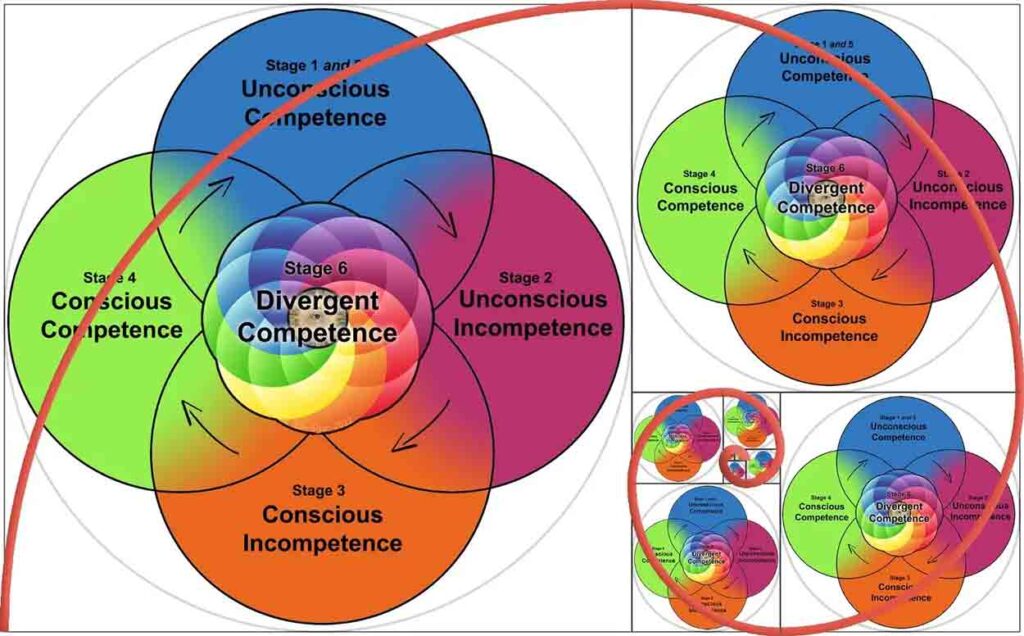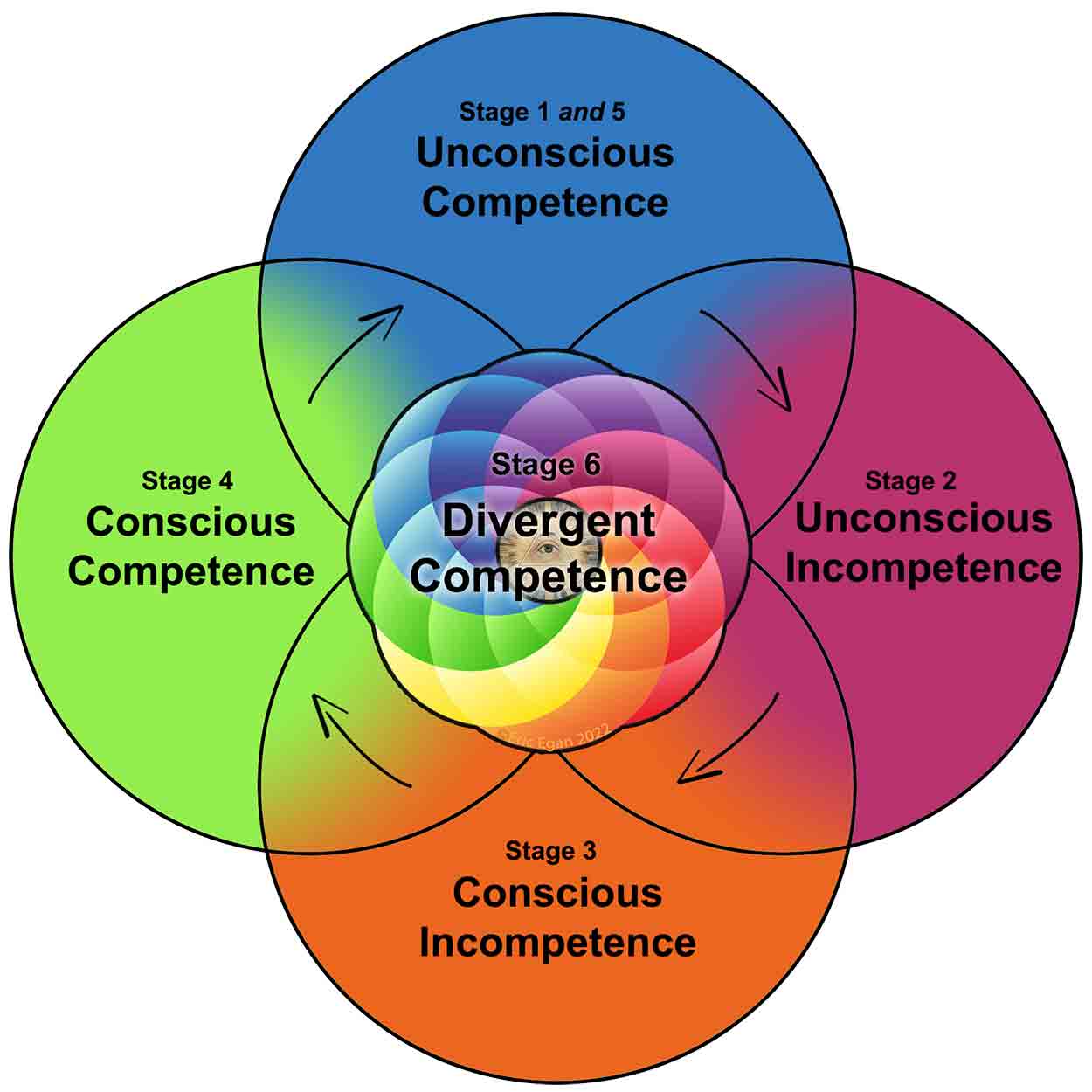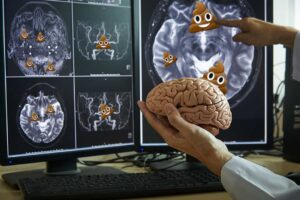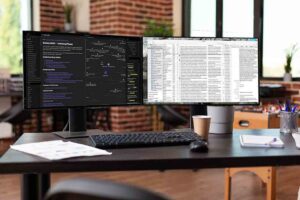The Six Stages of Unlearning.
The six stages of unlearning begin and end where the original model, “The Four Stages of Learning Something New,”1 ends – at the “Subconscious Competence” stage. You can learn more about the “Four stages of Learning” in another article, Why You Can’t Get There From Here.
The original four-stage model is for learning something entirely new for you.2 Learning something new to you is very different from replacing something you are already an expert at.
Learning a new way to do something you are already an expert in requires a lot of unlearning your old way while simultaneously trying to learn your new way. Replacing something you are unconsciously competent at is always more difficult and complex than building that new skill the first time.
Example
They say you never forget how to ride a bike. You never forget because you spent the time to become unconsciously competent at riding. You probably learned how to ride in a very short time.
What if you needed to unlearn how you ride a bike and learn an entirely new way to ride?
No problem! I can ride any bicycle, you think. That is what I thought too. You will be amazed at the difficulty your brain has in rewiring something you are unconsciously competent at. In my article, #2 Why Self-Help Is Not Working for You, Yet. See the section “When You Are Too Good At Being You.”
The videos are short and very interesting. You will quickly see it takes a lot more energy, effort, and time to unlearn the old you and learn the new you — at the same time. Vs. Learning something for the first time.
1. Unconscious Competence Stage
This stage is when you react to an event or can complete a task so well that you automatically and naturally decide how to respond without being aware of your deep decision process at all. These Automatic Natural Decisions are called ANDs, as in action AND reaction.
This deep programming is not just from things you have worked hard to master. Your core programming also came from your experiences with your parents, teachers, friends, the media, and more.
Are you surprised to learn that some of your deep programming was installed before you were even born?
Through Epigenetic Inheritance, you get some of your deep programming from parents, grandparents, great-grandparents, great-great-grandparents, and so on. These effects may go back several generations.3
You may also be surprised that some of your deep programming decides many things for you, then lets your conscious mind think you made the decision.
A study in Nature Neuroscience¹ found that “…our actions are initiated by unconscious mental processes long before we become aware of our intention to act.”
In other words, your subconscious mind decides what you will do and then covertly sends that information to your conscious mind. In a previous article, Why Some People Almost Always See Opportunities That You Miss, I also showed you how your mind is twisting reality right in front of you and blatantly lying to your face.

This is you, thinking you consciously make all the decisions in your life. 🙂 Adobe Stock
Unconscious competence (good or bad) includes your emotional skills as well. When someone “pushes your buttons,” they have activated one of your Automatic Natural Responses (ANDs).
How often do you stop, think, and decide what emotional response to have? Intentionally remodeling your emotional reactions, one at a time, is the focus of this article.
2. Subconscious Incompetence
I like a term I found for this: Fringe Consciousness. This is when you are just starting to become aware of the ghost in your machine, but it is still mostly buried in your subconscious.
You are not sure what it is, so you have no idea where to begin. However, enough is pressing on the edge of your conscious mind to make you start asking questions. Your mind has no choice; it must answer the questions you ask it. Your mind is an answer-seeking machine.
You must phrase your questions with the answers you want in mind. Do not ask, “Why am I always broke” because your mind will show you by reaffirming the bullshit you tell yourself.
Ask something like, “Why does money come so easy to me?” Your mind does not care if you are broke at the time. Your mind must seek the answer. The answers to that question will help overwrite the usual BS you feed yourself.

You beginning to become mindful of your subconscious. Author created with some Adobe Stock images.
One question leads to another; Why did I (decide to) react like that? Wait, I decided? I must have. Can I decide to react a different way?
Key question: How did I learn to react better so fast? These questions are like a spotlight into your subconscious mind. If you seek answers, I guarantee you will move to the next stage of competence.
“The key to growth is the introduction of higher dimensions of consciousness into our awareness.”
~Lao Tzu
3. Conscious Incompetence
You now have an idea of a reaction you want to improve. However, at this stage, you have not learned a better way yet and continue reacting the old way at first.
That’s OK. Even though you are still automatically reacting poorly, you can see it, you feel it, and you catch yourself in the act. Now you can seek a better way to respond.

Practices like; Mindfulness, Metacognition, and Cognitive Behavior Therapy (CBT), eventually cast a light on the ghost in your machine. Created by the author with Adobe Stock.
At this stage, you’re still messed up and not performing how you would like. That is why they call it conscious incompetence. There is an old saying, “If you don’t know what’s broken, you can’t fix it.” Now you can see one thing you can work on. Start as small as possible. Pick one tiny thing to fix: unlearn and relearn.
People are not disturbed by things, but by the view they take of them. ~Epictetus
Epictetus is correct. Now you can see the “view” of things you are taking. Now you can clearly see one of your once-hidden automatic natural reactions in action.
Now you can work towards a better intentional and conscious response rather than your old automatic, natural reactions. As Epictetus might say, now you can change your view of things.
4. Conscious Competence
Now you know something you were doing wrong and, more importantly, how to do it better. However, because you are still unlearning the old you and have not mastered doing it right, it is not automatic.
It takes a lot of work not to do it the old easy automatic way your brain really, really, (really!!) wants to keep using. (Your brain is more than lazy, it is very “green” and does everything it can to save energy).
The thing about the conscious competence stage is that you must consciously think about each step or process to react the new way, like your first week driving a car.
Yes, you could drive that first week, but all the steps to remember were stressful and took an immense amount of thinking and effort for you not to crash or get a ticket.
Look at you now. Now you don’t even remember how you drove home from work sometimes.
As you work to use your new way of reacting, your new way gets stronger and easier to use each time you make your brain use it. At the same time, as you stop using the old way, your brain “prunes” away what it does not use.
Slowly your old way starts to fade. Eventually, the old will fade altogether, and your new process will move to the next stage.
5. Subconscious Competence
You have come full circle. You have replaced a piece of the old you with the new you. It was not easy or quick; you have now used your new way of reacting so much that it is second nature for you.
Now you make Natural Automatic Decisions that you designed. This is one of the secrets of success and happiness, success on autopilot. What more could one ask for?
All done, right? If you wish. Then you realize the thing about infinity is there is always the next level to transcend to (or descend to). Like Jacobs’s ladder, keep rising, keep seeking to get better and stronger until you go to your real home.
Each time you go through an evolution of the six stages of competence, you are ready to start on the next level (up or down). This grows like the Fibonacci sequence, building on your past efforts.

Image by the author.
FYI: If you try to teach from the subconscious competence stage, you may not be able to give your students the parts of yourself you cannot see or feel.
We all know experts who can’t tell you how they’re doing what they’re doing. (Linda Gilbert, Ph.D., May 2004).
For more information on why people can’t teach from this level, see my article, #2 Why Self-Help Is Not Working for You, Yet.
You can only teach what you know, right? In a way, most of your Automatic Natural Decisions are not really known to the conscious you that is reading this now.
This is especially true for the ANDs you installed as a child or before birth. You need the spotlight of deep and wide self-awareness for the last stage of competence.
6. Divergent Competence
I stole the word divergent from the movie with the same name. The movie is about a dystopian future where society is split into five groups called factions.
Each faction has strengths unique to them that the other groups lack. However, if you do not fit into a faction, you are an outcast.
The main character, Beatrice, is the first and only one to have the strengths and abilities of ALL the groups. Because of this, they call her “Divergent.” In the same way, Beatrice has the abilities of all the groups; someone at stage six, divergent competence, understands all the stages of competence.
This is guru-level self-awareness. Only the teacher that has attained subconscious competence and retains a deep understanding of all the other stages of competence can truly teach.
You have divergent competence in some areas. You can drive to work or the store like you have a thousand times without thinking about the driving process; subconscious competence.
However, even though you can drive at the subconscious competence stage, you can still help someone learn how to drive because you can remember how you felt when you first started driving.
You can even help a soon-to-be driver who is at the subconscious incompetence stage by giving them all the things you wish you knew before you started driving.
On the other hand, a champion race car driver that has spent years perfecting her craft might not be aware of all her Automatic Natural Decisions.
Thank you for reading.
If you enjoyed this, please subscribe to our email list below.
Also, if you would like to contribute an article to The Science of Destiny, Contact us.
References
[¹]: Broadwell, Martin M. (20 February 1969). “Teaching for learning (XVI)”. wordsfitlyspoken.org. The Gospel Guardian. Retrieved 11 May 2018.
[²]: Adams, Linda. “Learning a new skill is easier said than done”. gordontraining.com. Gordon Training International. Retrieved 21 May 2011.
[³]: Lacal I, Ventura R. Epigenetic Inheritance: Concepts, Mechanisms and Perspectives. Front Mol Neurosci. 2018 Sep 28;11:292. doi: 10.3389/fnmol.2018.00292. PMID: 30323739; PMCID: PMC6172332.





